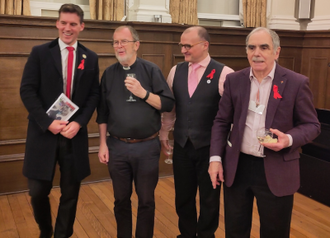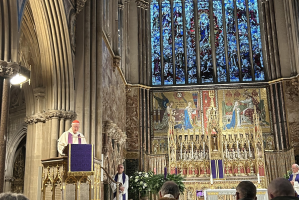Fr Brendan Callaghan SJ - Homily for World AIDS Day

Westminster City Cllr Ed Pitt Ford, Conservative LGBT+ Lead, Fr Brendan Callaghan SJ, Alberto Gonzalez (Positive Faith) Martin Pendergast (LGBT+ Catholics Westminster)
Fr Brendan Callaghan SJ delivered this Homily during the World AIDS Day Mass at Farm St Church in Mayfair, London on Tuesday 26 November 2024.
A number of years ago now, an American political scientist published a book called "The End of History". The title came to my mind as I started reflecting on our World AIDS Day mass today, precisely because we have had so much 'history' in these recent years that we risk being overwhelmed by it.
With so much information being thrown at us - both true information and false information - we can easily lose sight of the realities of our world. Major events, both past and present, can become invisible behind the accumulated 'instant' material of our 24/7 news cycles, and it becomes more and more difficult to keep hold of what is genuinely important. Our attention is caught up by the immediately significant: moments like World AIDS Day are required to keep us aware of the priorities of our world.
And as we try to assimilate all that is presented to us, so also we become less able to see that the world is always and everywhere God's world, the world in which God is always and everywhere involved, the world in which God's active love - God's grace - is always and everywhere at work.
St Ignatius, the founder of the Jesuits, encourages us to find God in all things - not just the 'nice' things or the pious things or the reassuring things, but all things. And that includes all those "things" - in the world, in the Church, in each other, in ourselves - that we would rather not even look at, let alone be open to finding God there.
"Finding God in all things", it seems to me, can easily be misunderstood. It can become a comfort-blanket for the spirit in the same way as the most famous words of Julian of Norwich can: "All shall be well, and all shall be well, and all manner of thing shall be well." But properly understood, both Ignatius and Julian are pointing us to the necessity of recognising that God is there in what we too-easily see as utterly negative and destructive: in the words of Paul in the Letter to the Romans, "all things work together unto good for those who love God," or in an alternative translation, that "God works all things together unto good."
But it often seems safer to hold onto what I know (or think) that I can do, to hold onto what I know (or think) that I can control. And somehow I do this even as I look at what is manifestly out of my control in my own life and in the world around me.
St Paul knew about this, because what we talking about is pride in its most fundamental and pervasive form, and Paul knew that God was working in his life to protect him from this pride. The Lord had said to him, "My grace is enough for you: my power is at its best in weakness." And Paul could respond "So I shall be happy to make my weaknesses my special boast".
It seems to me that the community of the followers of Christ has lived with this tension through all of its history: on the one hand, fear driving us in pride to hold onto what we think is our ability to control our life and the life of the church; on the other hand, understanding and belief and trust inviting us to allow our gracious God to work in and through us, and particularly and precisely to work in and through what we see as our weaknesses.
In the Second Vatican Council the church took a decisive step - away from its defensive pride against a world perceived as hostile, and towards recognising that same world, broken and incomplete as it is, as always and everywhere God's world, to be served by a church which is itself broken and incomplete, but infused by the Spirit of God. In the Synod on Synodality we are getting to grips with living-out this decisive step: it's a slow process, because it's a challenging process, and for some people it feels like a threatening process.
It's not difficult to see how some who have been called to positions of leadership and service in the church respond as if threatened by challenges to their power and prestige: it's more difficult for us to recognise how we, in our positions in the church, also misunderstand and fail in our responses to God's gracious call to freedom: "My grace is enough for you: my power is at its best in weakness."
We are unwilling or unable to see the realities of our world, and so unable or unwilling to respond to them, because what St Ignatius calls the bad spirit - all in us and in the world that works against God - has persuaded us that it all depends on us, and so there is nothing really we can do. But the Spirit of God calls us to recognise that God is to be found in all things, and that God's power is at its best in our weakness. To the measure that we respond to that call of the Spirit, we move into the freedom of God's effective love, into the freedom of being agents of that love.
As we celebrate World AIDS Day as members of a church rediscovering its essentially synodal character, we can remember with gratitude how the coming of HIV & AIDS challenged many followers of Jesus to move from fear to trust, from a judgemental exclusion to a welcoming inclusion. It doesn't need saying that not all of us were able to respond in this way.
It does need saying that many people outside our communities of church and belief responded and continue to respond with deep and inspiring inclusive compassion, service and love. I can hear Jesus repeating "Nowhere in Israel - nor in the new Israel of my followers - have I found faith like this!"
It does and it doesn't need saying that we as followers of Jesus are called to a truer and deeper metanoia in this dimension of our being with Jesus, of our being where Jesus is in our world.
Four decades on from the start of the HIV/AIDS pandemic, we are continually challenged to grow in inclusiveness. In our current world - still traumatised by COVID - it is all too easy to lose sight of the fact that more people than ever (more than 30 million) are now living with HIV. As CAFOD reminds us, only half of those who need treatment are receiving it, and stigma, taboo and misinformation persist even as medical progress continues.
The final document of the Synod offers us these thoughts.
… Jesus never sent anyone away without stopping to listen and to speak to them, whether men or women, Jews or pagans, doctors of the law or publicans, righteous men and women or sinners, beggars, the blind, lepers or the sick. By meeting people wherever their history and personal freedom had led them, He revealed to them the face of the Father. By listening to the needs and to the faith of those He met, and by responding through words and gestures, He renewed their lives, opening the path to healed relationships. …
… When we listen to our sisters and brothers, we are participants in the way that God in Jesus Christ comes to meet each of us.
It's worth repeating that last, because we can too easily let it slide past us: we are participants in the way that God in Jesus Christ comes to meet each of us. We are not simply imitating or honouring or remembering - we are participating in God in Jesus Christ coming to meet us.
God is to be found in all things, and all shall be well.
In being invited as we celebrate World AIDS Day to respond to the continuing challenge of HIV/AIDS, we are being invited to that inclusive welcome that we are learning to live as a synodal church. To state the obvious - and you will have probably seen this coming - it's one invitation. And if we are to act on that invitation, in this dimension of the realities of the world, then as individuals and as church we need to recognise where we have been led into false beliefs about what God can and will work in and through us. In different words: we need to allow God to enable us to change and to grow, we need to repent.
On October 1st, at the beginning of the second session of the Synod, there was a penitential service in which each person participating - in person in St Peter's or online across the world, was invited to acknowledge themself (and I quote) "as a member of those who, by omission or action, become the cause of suffering and responsible for the evil inflicted on the innocent and defenceless."
The last of the petitions was read by Cardinal Christoph Schönborn, archbishop of Vienna:
I ask forgiveness, feeling shame for when we have transformed authority into power, suffocating plurality, not listening to people, making it difficult for many brothers and sisters to participate in the mission of the Church, forgetting that we are all called … to become living stones of the one temple of the Holy Spirit.
And before the bad spirit can pounce again: repentance isn't beating ourselves up; repentance is moving into the freedom of God's effective love, God's grace, moving into the freedom of being agents of that love.
God is to be found in all things, and all shall be well.
I began with a reference to "The End of History". Let me conclude with a different understanding of history, by drawing on what Francis wrote back in 2021:
May we let ourselves be moved by the mercy of the Father, and allow this to become our own life's work; a discreet mercy, silent and hidden, but still capable of sustaining and restoring the life and history of each one of us.
God works all things together unto good
My grace is enough for you: my power is at its best in weakness.
You have believed, so let this be done for you.


















